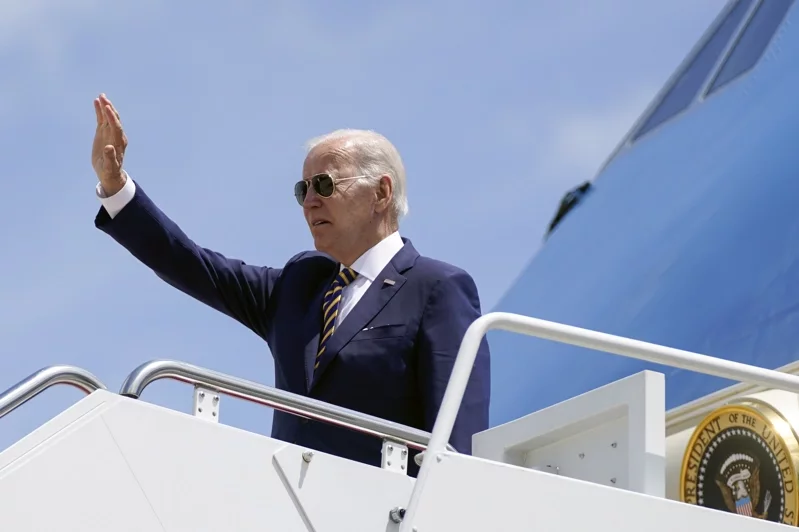See

President Joe Biden has embarked on his first visit to South Korea and Japan. On his itinerary are plans to meet with Japanese Prime Minister Fumio Kishida in Tokyo, after which Biden will announce the Indo-Pacific Economic Framework. This economic framework, initiated and led by the U.S., will become the focus of scrutiny by political commentators and strategists around the globe.
When the U.S. announced last November that it would begin forming the Indo-Pacific Economic Framework, the secretary of commerce told Congress that it was intended to strengthen commercial and economic relations between the U.S. and trade partners in the Indo-Pacific region; it was not at all aimed at China. However, this statement obviously differs with how other countries around the world recognize the nature of the Indo-Pacific Economic Framework.
In many statements and policy discussions, the Biden administration’s team has pointed out that this economic framework is aimed at facilitating trade processes, establishing digital economic and technology standards, strengthening the supply chain’s stability and resilience, and implementing energy conservation, emission reduction and clean energy strategies. Furthermore, they say it is about such aspects as jointly investing in infrastructure construction and setting labor standards and work norms. It is absolutely not directed at tariff reduction or adjustment. Still, many in the media and experts in international politics appear to be unconvinced by the government’s declarations.
Because Washington and Beijing conflict on many issues, the tense relationship left over from Donald Trump’s presidency has obviously improved little since Biden took office. On his current trip, Biden hopes to score trade achievements through the Indo-Pacific Economic Framework and to create an economic organization initiated and led by the U.S. Whether his plans are deliberately aimed at Beijing or exclude Beijing’s participation has drawn the notice of all parties.
Before Biden departed, media reports about the framework pointed out that the U.S. government had already made arrangements related to staffing and follow-up negotiations with other countries. They selected Sharon Yuan, who worked on the Trans-Pacific Partnership, to coordinate the framework as chief representative. It would seem they are prepared and ready to go.
If we want to orient the direction of Beijing and Washington’s future relationship from the perspective of a power showdown, as well as regard the Indo-Pacific Economic Framework as a policy implement with which to consolidate allies and exclude and reduce Beijing’s trade and economic influence, then we must examine the possible strategic effects of the framework from the following angles. We certainly must not overconfidently interpret the framework’s strategic significance or overestimate the influence it might exert in cooperating with other countries through economic and trade processes.
First, we must identify how many multilateral and bilateral economic and trade cooperative agreements exist currently around the world. How much space is there for the Indo-Pacific Economic Framework to operate freely? Certainly, economic and trade cooperation issues and projects will always be created as technology develops and modes of economic and trade operations change. Nevertheless, basic economic and trade laws remain unmoved. International powers have their own strengths in manufacturing, financial services, technology standards and market size. No matter how the framework will exert influence by creating new issues and projects, we should consider how much space there actually is to hold it.
Second, I should point out that no matter what level the economic and trade agreement system is operating on, from the most fundamental level of free trade region and customs union, to the level of a common market and economic and trade union, its primary function is to strengthen trade between member countries. Whether the agreement is aimed at manufacturing actual goods or investment in the service industry, the free circulation of people, goods, services, investments and information benefits and targets member countries. Yet these mechanisms certainly do not exclude, reject or even block trade between member countries and those outside of the economic and trade system.
Based on this basic principle, we absolutely cannot think that the Indo-Pacific Economic Framework is an effective enough mechanism to block or curb China’s foreign trade and economic exchange. Economic and trade organizations cannot be tools used by the international community to confront each other. Military organizations that regard economic and trade organizations as part of Cold War era defenses used to produce specific targets to counter and block are making a fundamental mistake.
Such absurd imaginings by international social strategy experts, as well as the media, originated when the Trans-Pacific Partnership and the Regional Comprehensive Economic Partnership were being formed. Political commentators projected their imaginings as a confrontation between the U.S.-led TPP and the Chinese-led RCEP, which is simply tilting at windmills and self-deceptive. Faced now with Washington’s proposed Indo-Pacific Economic Framework, this kind of fantastical thinking has resurfaced. We must avoid being swept away by it.
Taiwanese society is truly filled with disquiet and fear. This has been created by the anxiety of facing the economic and strategic pressure produced by China’s rise, in addition to the inability to smoothly stabilize dealings between both sides the strait. Therefore, people project their emotions in an extreme way, like someone grasping for a branch as they’re drowning, in the hopes of finding a release through certain expectations. If they are expecting, however, that Washington will block or counter Beijing with the Indo-Pacific Economic Framework, their hopes are misdirected!
Finally, we still must remember that no matter how loftily Biden is handling the framework, we should carefully weigh the pros and cons of whether we join. After all, bracing for rejection when trying to make friends with the high and mighty is not as good as having one’s feet on the ground and maintaining stable foreign economic and trade relationships. The realities of the economy and trade are incomparable, but people cannot live on reputation alone. Maintaining a secure position is the key to preserving strategic strength!

Leave a Reply
You must be logged in to post a comment.